An office in Berlin, how Russian startups differ from German ones - and why do we need geoservices for the good old shops offline?
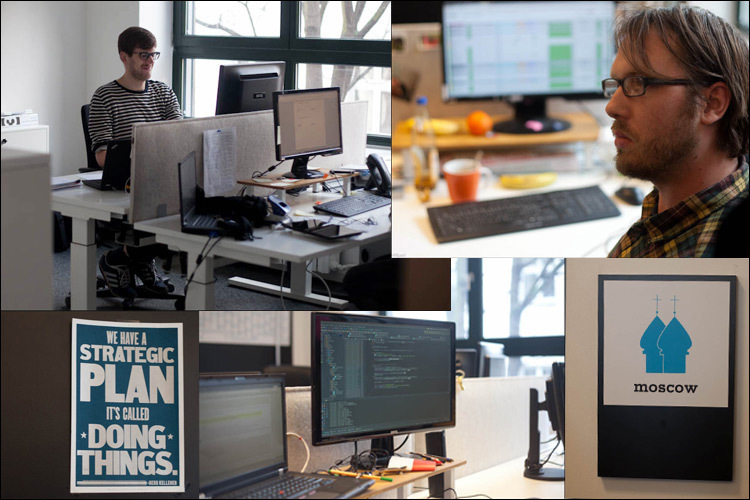
“And we called Moscow the darkest conversation”
It was like this. The guys were sitting in the attic, drinking compote - and then an idea came to them. They decided to make a website about products and prices in Germany - well, you know, like our Yandex.Market, only with geolocation and subscriptions. The problem was that in Germany, then, the main retail lived offline.
The head of the network, for example, could turn out to be a respectable 77-year-old grandfather. No, he heard about the Internet, but he suspects that this is a tricky kind of SMS. Mail, it is quite possible that he is carried printouts every morning. And he is confident that what has worked for the past 30 years will work in the next 10. This situation is much in place, because large businesses in Europe are often run by families. The most beautiful thing is that the guys still found it as simple as a log, but a very profitable way to use it to develop their project.
')
Careful, traffic - a lot of photos of their office.
So Berlin is three and a half million inhabitants. They are positive, solvent, modern and very fond of shopping. Almost everyone has a smartphone, Internet penetration is much higher than in Russia. Plus, this is a city of startups - here it is relatively easy to get financing, it is rather cheap to rent an office and live.
Farther? Then they still filed their project in 2008 and opened in several more countries. For me, their work is perhaps the first close-familiar example of an IT startup whose goal is something practical, and not a way out to a major investor.
Therefore, when the opportunity arose to go to the press tour and go around the KaufDA office, naturally, I agreed. Let's now see how it happened with the German guys.
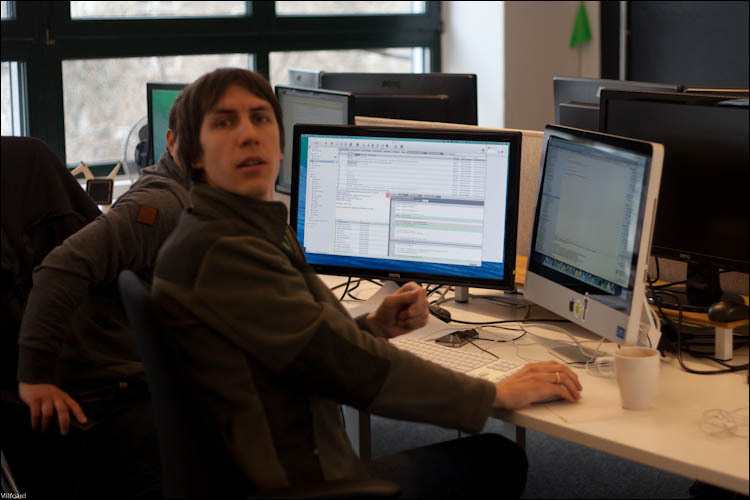
Pair programming. The only Russian in the office looks at us - a Ukrainian. At the same time, he did not even see the team code from Moscow. UPD: it turns out this is n0_quarter
Initial data
So, at the start you are just a couple of people. The leader, Christian Geyser, is well versed in IT and business, plus he knows the needs of the market from his experience at Goldman Sachs in London and McKinsey in Zurich. There is an attic and an idea - to make a geolocation service, where you can search for goods on the map. It seems like I typed a "blanket" - and found out where you can buy a blanket nearby, plus I looked through the catalogs of stores.
In theory, all this should have been earned, if not for the very “but” in the form of retail, which did not really understand why she needed such a thing. They do not even have XML with the unloading of goods - and no one will do it for a small project.
True, everyone has a paper catalog. Germany, there catalogs - this is one of the main sales channels. They are given at orders, sent by mail and sometimes even spammed. And this is where the paranormal begins. Our heroes take this catalog and gently parish - where the machine gun, where the hands.
Why paranormal? Because these catalogs are the sea - and this is simply not possible to handle with such hands. But no, nothing of the kind - it turns out, it is necessary to negotiate only with large networks, where one directory makes it possible to cover a couple of hundred stores at once. Secondly, it didn’t fit in my head that only 5-7% of the assortment can be shown - auction items, bestsellers and the like. But for the Germans this, it turns out, works simply with a bang.
So, at some point a site appears that allows you to score the name of the product and find it on the map of the city.
And now the coolest in history
It's not enough to make a startup that works. It is important to develop it enough to have money for a mobile application, and a normal office, and much more. And three years after the start of the transaction ends. The KaufDA project was purchased by the Axel Springer AG publishing house, which is “Maxim” and “ComputerBild”.
The logic is perfect. A small project can become a serious problem in the future - in fact, in fact, it slowly takes away the audience from print advertising. Buying Axel Springer AG has removed this threat. In theory, he could immediately bury this project, but no - the shares were divided in such a way that about 20% of the shares remained with the original team. Also did not change the CEO.
Now one more. Axel Springer AG is able to sell ads and is well known to everyone in the market. Residents of Germany do not ask themselves whether to buy services from him or not - the only question is which budget to use. Therefore, very quickly the project managed to capture approximately 80% of the market.
Here different clones started to start, but with such a base it was necessary only to expand quietly.
Regional versions
The obvious threat was that in large countries the project may not be the first on the market - and when it gets to the region, there will already be a strong competitor. And while the threshold of entry is passed (basic software for different countries, in general, the same). Therefore, the next step was a fairly rapid expansion. They now have offices in Chicago, Paris, Barcelona, San Paolo and Moscow.
Each country has its own name. We have - Lokata. About our market, Christian said that if it works in Russia, it will be proof that the model is suitable for almost all countries. For him, this is a challenge: the market is large, but completely incomprehensible.
Now let's take a look at the kitchen of all this.
Office
We come here from this street and go by houses as in office buildings of Petersburg:
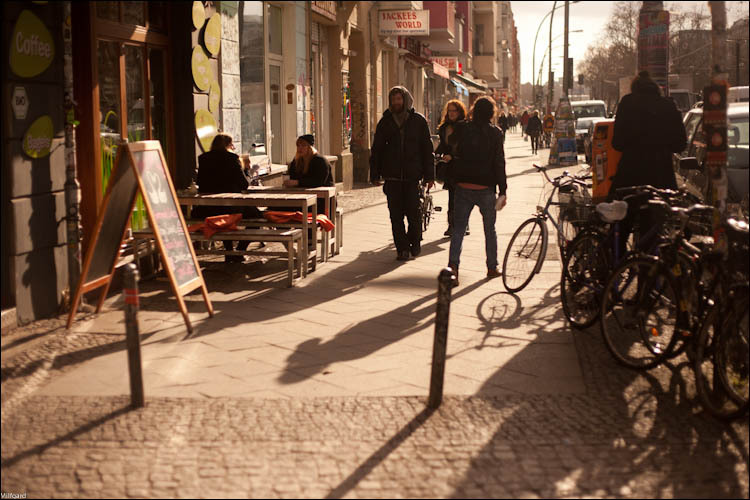
In Berlin, in general, they love to ride bicycles; therefore, in front of the office there is a two-story cycle parking:
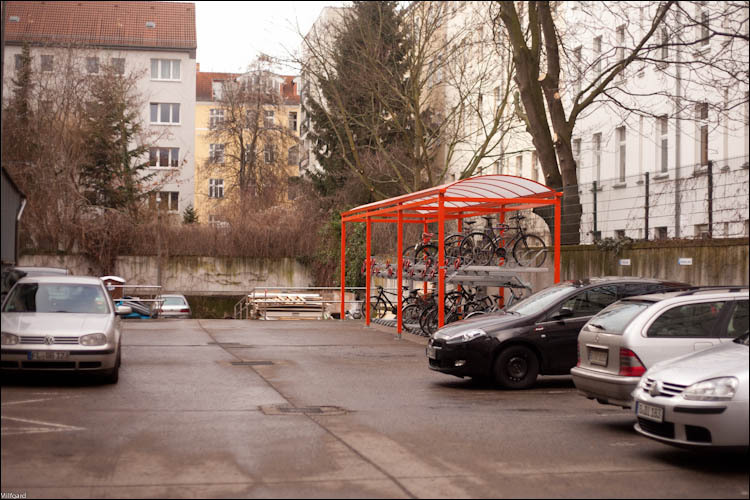
The team includes developers from almost the entire planet. Christian says that every year they have a new office - a permanent expansion.
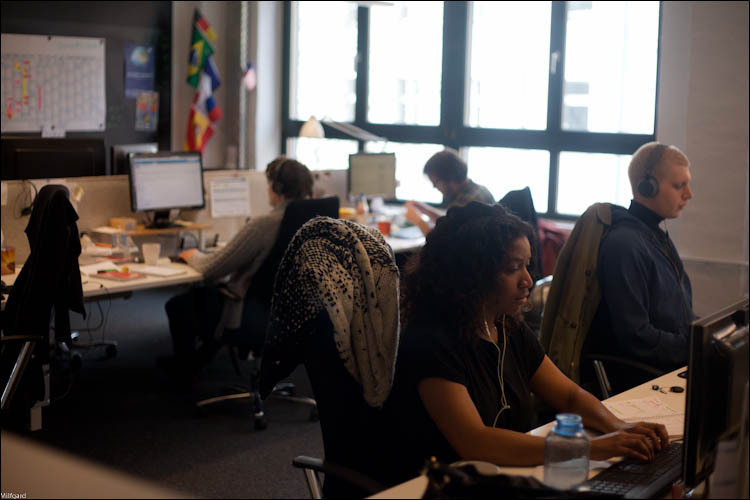
Here is the office space.
In Berlin, IT specialists are constantly needed, mostly developers. For comparison, the average salary is higher than in Moscow, but the same cost of renting an apartment is lower. Locals assured that for 500 euros it is quite realistic to rent a one-room apartment in the center (not directly in the center, but by analogy with our Garden). In Moscow, the same apartment starts at best from 700 euros (about 35 thousand rubles). With knowledge of English you can already work here. Developers are looking for in all countries and write out here - even a resident of Australia met in the office. That is why Berlin is almost the IT capital in Europe. Well, let's say, one of the hubs.
This creates conditions in which it is very difficult to motivate people with salaries. Therefore, large projects are invested in particular in offices - a place where it is comfortable and cool to keep the best developers.
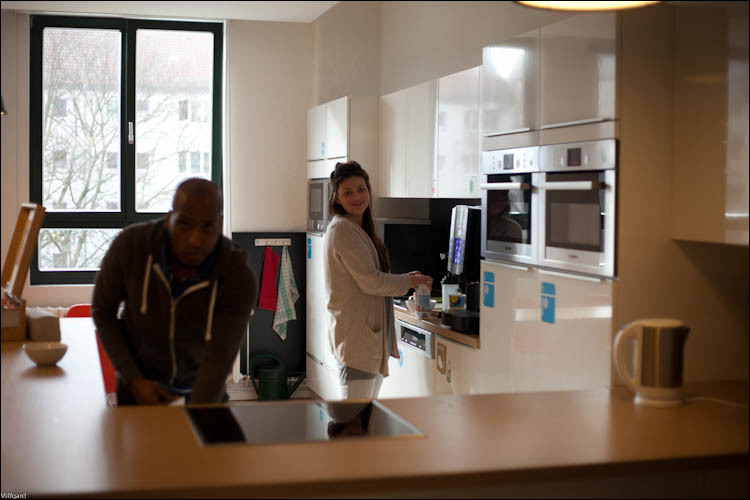
Kitchen. Here they eat what they bring from home themselves, there are no free lunches.

Sandwiches are stuck on tooltips.
They didn’t let them onto the roof - recently someone managed to climb on the floor through this “hole” in safety, so they have locked the exit and are reworking something.
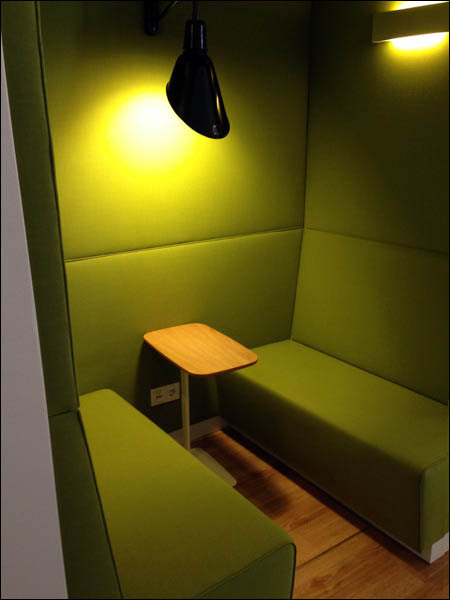
Next to the kitchen there are two mini-rooms. A table under the laptop, sockets, sofas. It is very convenient to call, discuss briefly something or just work the guest office. Cool.
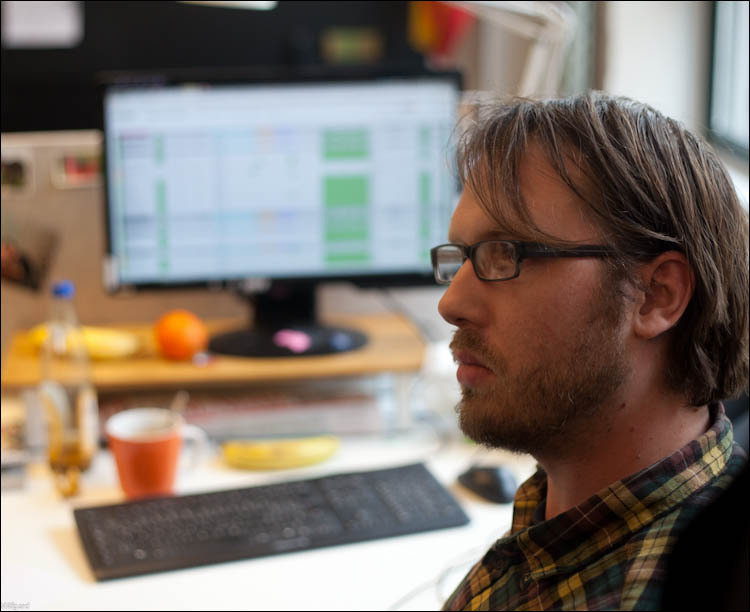
This guy is now checking the new directory - looks at how well the bindings are made. Handwork.
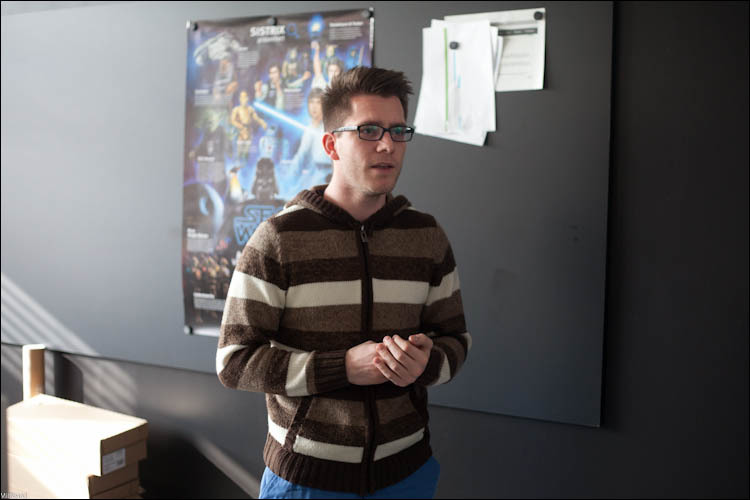
SEO specialist
The approach to SEO is generally very interesting for Russia. They do not buy links in principle, because they follow Google's guidelines. In Europe and the USA, they are very well optimized for Google, but Yandex and we have trouble right here. Nevertheless, they say that Google’s requirements are primary.
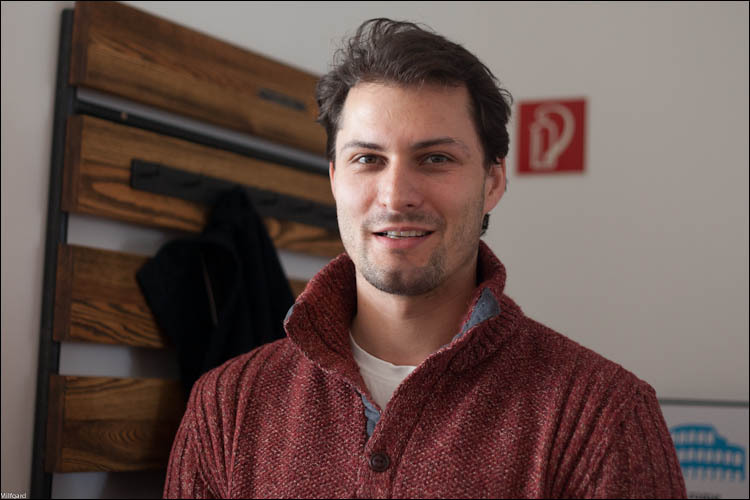
Thomas, Technical Director
The project has 5 IT-teams, plus there are still Russian and Brazilian developers - they are engaged in localization and fasten local features. Judging by the organization of work teams - the architecture is very good, and the backend is firmly divided with the presentation layers. They use Agile / SCRUM, run sprints for two weeks, because Continuous Integration. And salespeople are walking around with new ideas. The code is rummaged between teams of different countries.
Thomas is not at all like the German CTO. They say that when there were negotiations with the investor, he just came from the south to the tanned one, and the team was very worried that the investor would not believe about the strong IT side.
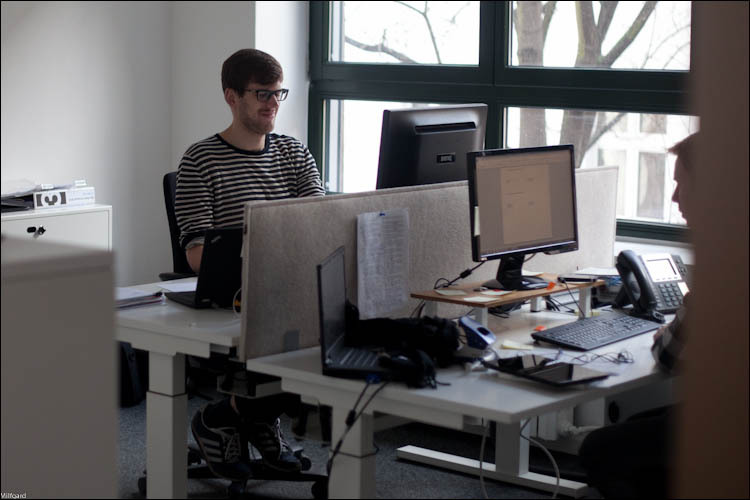
And this is the right IT specialist. Only he is the company's financial director.
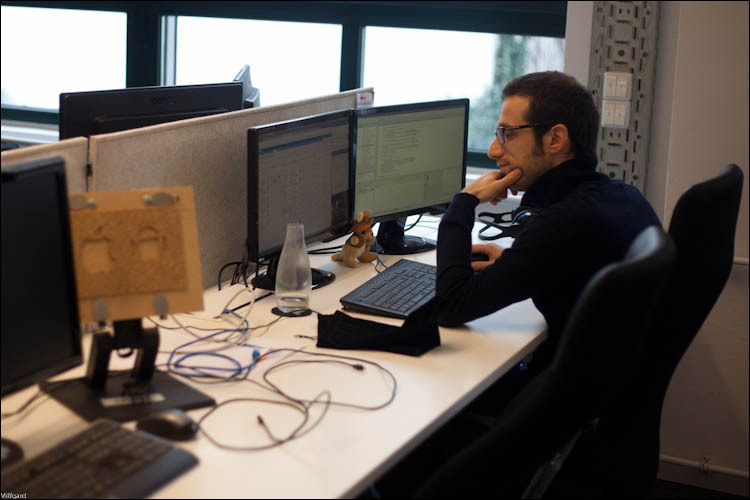
Many have a desktop + laptop or two screens.

Write the code!
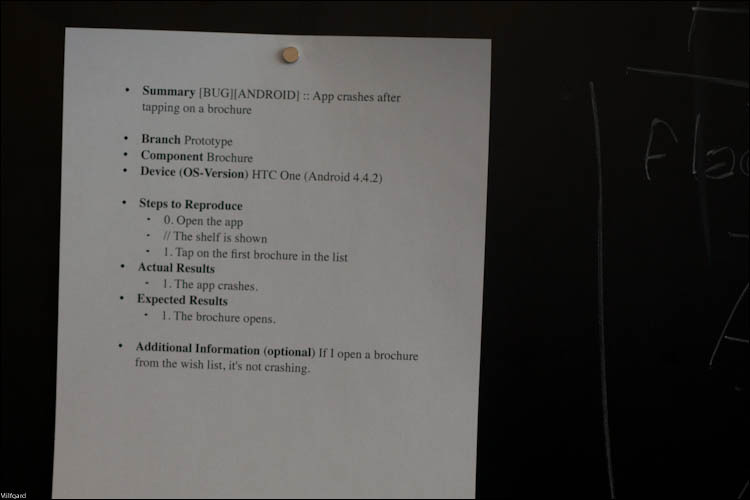
Bagreport Form
The backend command has such a screen hanging here that shows current statuses in real time. It looks very cool:
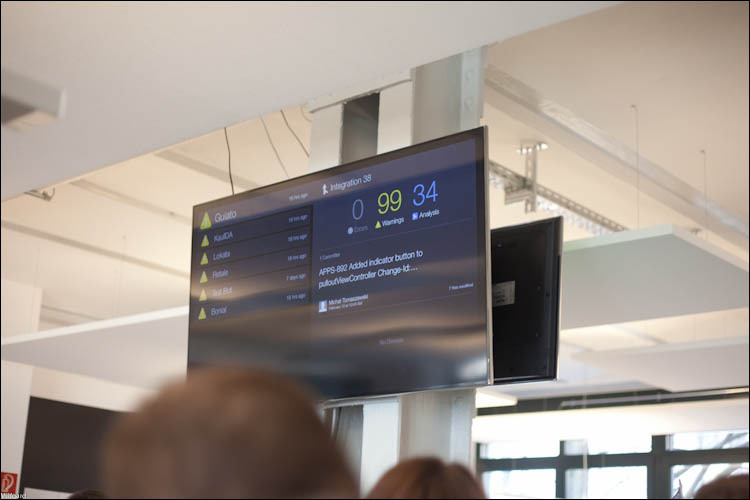
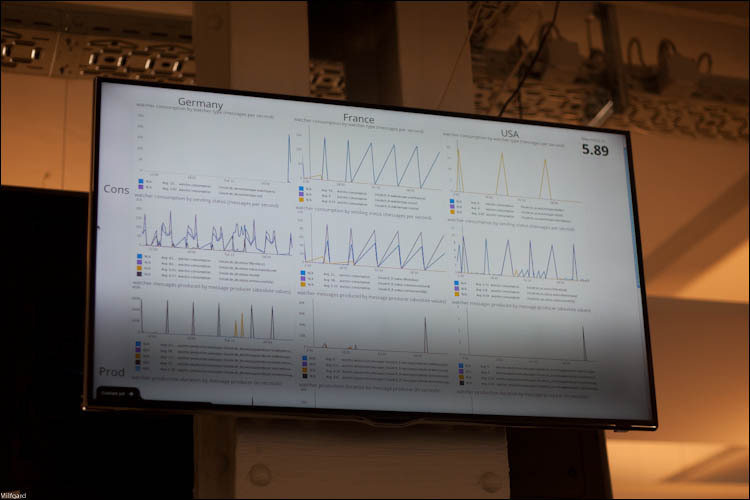
Agile board:
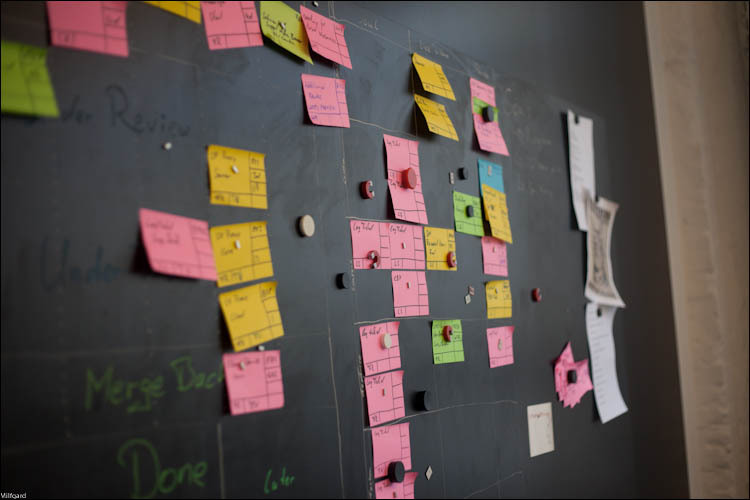

Reminders about user scripts for usblists. By the way, designers are very pleased with the Russian market. The fact is that we have the largest comparative share of tablets to smartphones - that is, more people see catalogs on large screens. In other countries, the proportion of small screens is higher.
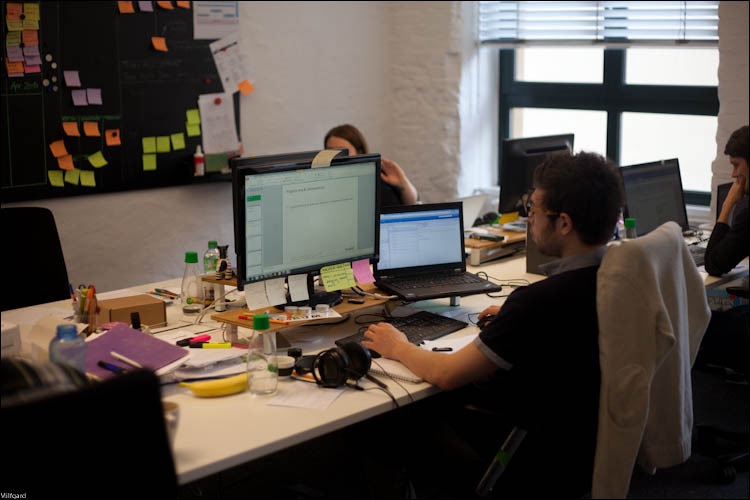
In the stickers really almost everything.
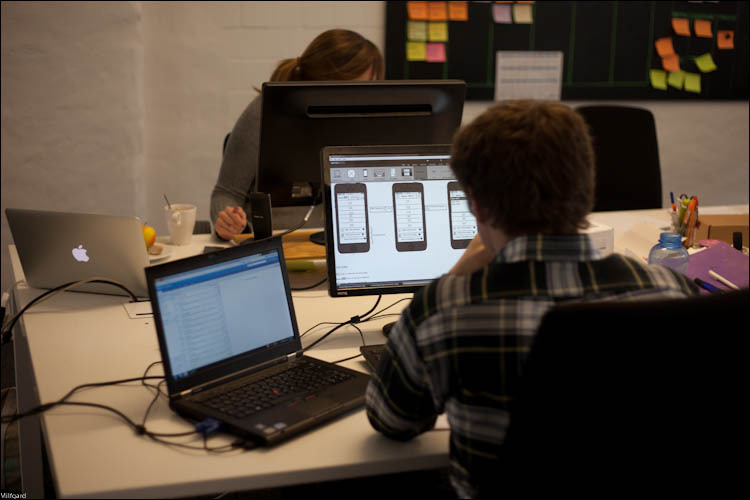
Mobile version development

Tables content managers. Judging by the comments, this is just the incredible quintessence of the mess)
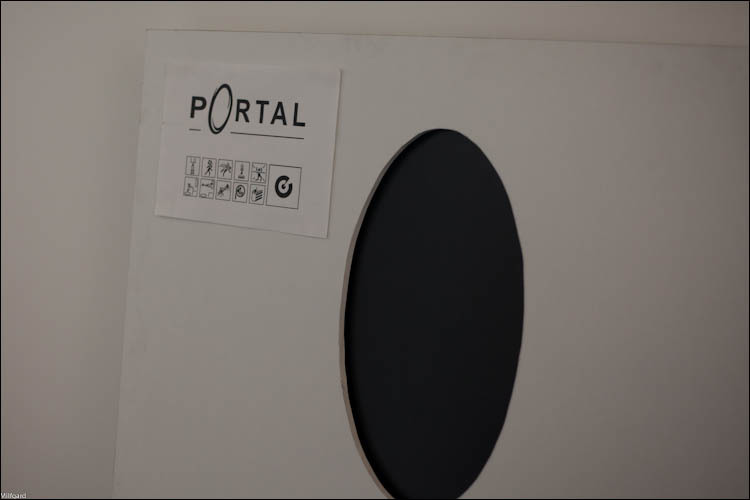
Suddenly art on the wall.
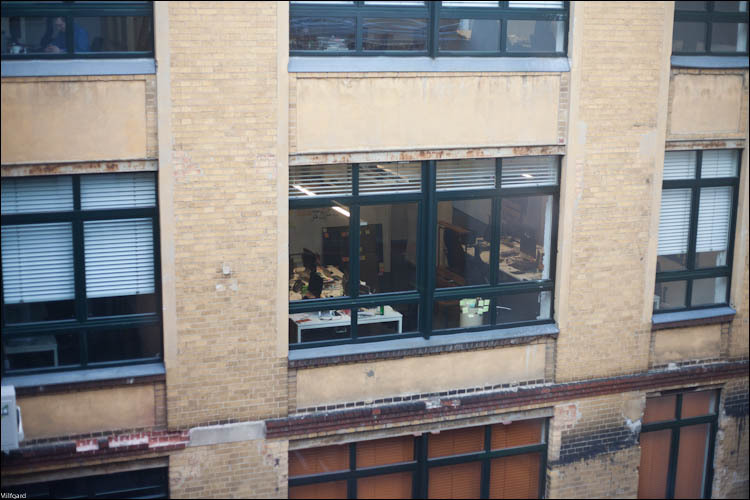
From the windows of the tops you can clearly see what the departments are doing.
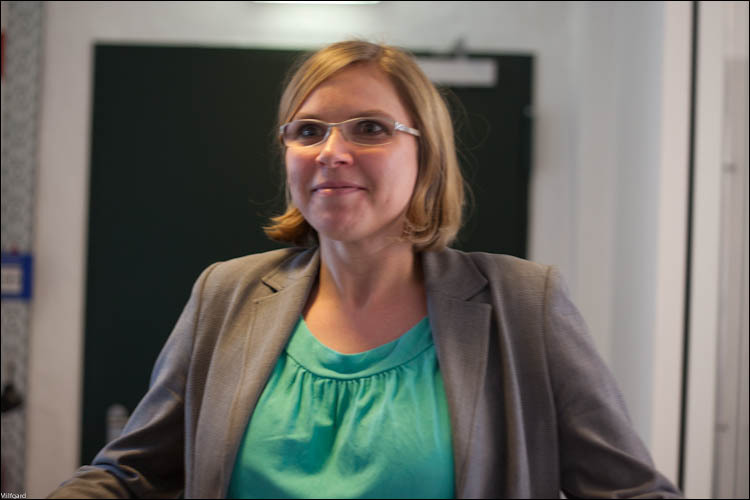
HR. Looking for developers purposefully, always directly (without agencies). When a job is open, it usually sees about 100 candidates from all over the world, 5 of them are inviting to Skype interviews. Then chooses one. The turnover is lower than the average for Berlin - every seventh year leaves, and usually every third. He says it’s very easy to find people with technical skills, but it’s incredibly difficult to work in a team and communicate correctly. And the code is common, everyone should understand what and why - plus everyone should be interested. Therefore, such a selection.
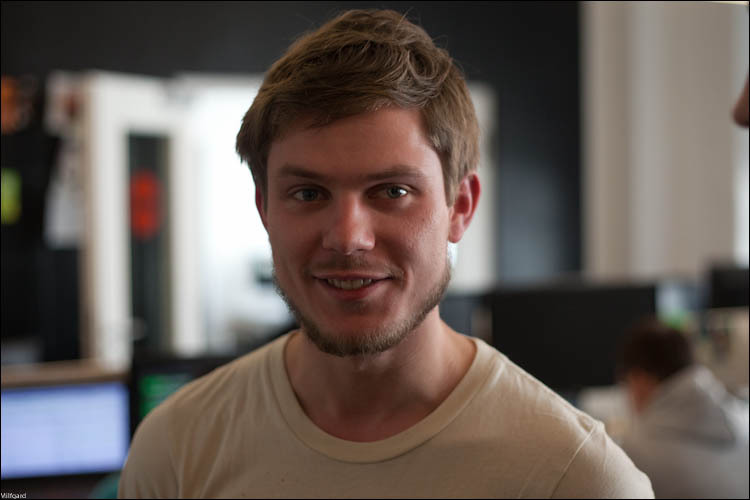
An employee who is in the project from the very beginning

Meeting standing is very cool. During the meeting, they recorded everything on the board behind.
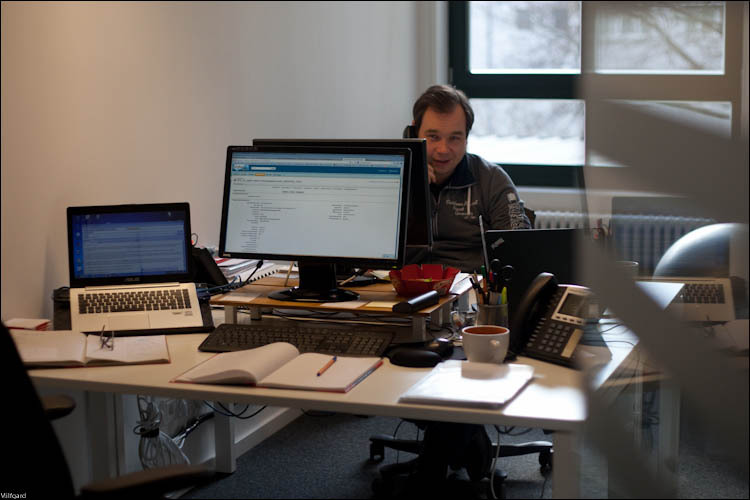
The only salesman. The smaller they are in the office, the better. Usually they are in meetings: a big business by phone or mail does not work.
Another thoughtful moment about salespeople - they are mainly from the print or television market. That is, they say not with incomprehensible words for the client, but with quite understandable good old terms that were 20 years ago. It really helps. The CEO is also constantly engaged in sales - it is important for him to travel as a company representative to the crucial meetings.
Why is this not solved by the store’s own applications?
Let's wind it back a little. Geoinformation service. Why does it exist at all, after all, it would seem an obvious step - retail should release its application with a catalog? But no, it does not work. For example, in Russia, the Lokata application was downloaded more than 600,000 times, and network applications (according to unconfirmed data) are downloaded on average 10-20 thousand times. They explain it is simple: you can pick up on the tablet or phone 1-2 directory of favorite stores, but not 5-10. And here everything is in one place, plus a search.
The most sudden was the fact that quite a large part of the users of our Lokata enjoys the attention of data on grocery stores (supermarkets). This may seem a surprise only at first glance: after all, the grocery model “in two houses” implies constant work with a paper catalog. These newspapers, catalogs are at the checkout of each: there are listed discounts, new items and seasonal products. Paper versions rather increase the average bill - and the online version in the form of the same directory in Lokata does the same. Plus, as it turned out, there is a functional check list of purchases, which is quite convenient for wives who collect husbands to the store.
The second important vector of the application is the ability to subscribe to new categories. For example, if your daughter has three Barbie dolls, it would be cool to know when a new one appears on the corner of the store. To bypass his side on the way to school - or to still be aware and buy. It seems to me that it is the subscription interest functionality that is exactly what can make applications of this class really useful.
And the third is the opportunity to push notifications around the store. It works like this - you go to the mall, and you receive a message that on the fifth floor there is a new collection in your favorite store. As part of the test, we tried to do the same, ordering advertising from a mobile operator (SMS with a discount on certain goods was given in the area of coverage of the shopping center BS), and it worked quite cheerfully. Given that in the application the price of contact is several times less, this is probably cool. Protection against multiple notifications is also already out of the box.
Conversion
It is clear that tracking the arrival of people from such a geo-search to the store is almost as difficult as understanding how many people came from advertising on television. That is, as usual - demand decomposition or survey.
The survey they conducted. The results are intriguing: the fact is that in the category of supermarkets 70% of those who were searching for something decided to visit the store and 63% made a purchase (it's hard not to buy something if you are in the grocery store). The average check in the grocery of such a buyer is 1600 rubles. In electronics, the rate of shopping is 64%, purchases 27%, the average bill is 13.200 (and 9.600 for household appliances). This is Lokata data for Russia. Yes! Moscow, by the way, they have quite a few in the audience - this is not 80/20, but rather, on the contrary, when the regions prevail.
Generally
The German project is now in the black - this is already a major achievement. 60% of the profits are generated by users with smartphones and tablets. They now have more than 2 million mobile users per month, 14 million downloads of a German application (against 600 thousand in the Russian Federation), they are in the top markets of Europe. Actively open offices in other countries. Where - every time a surprise, for example, “Project Switzerland” opened in the USA. Now, judging by the boards, in the work “Project Tokyo” - probably, Australia.
They try to develop about Russia, but they face the problem that they are always sent to a specialist on the site. And when he finds out that people will not come to the site, but they will come to the store - he immediately becomes uninteresting, because his reports are usually for visitors online. Well, here Lokata doesn’t have such a player as Axel Springer AG behind him so that he doesn’t have to explain that the project is necessary.
The main ways of the evolution of online commerce in Germany
The sweetest thing for us is this excursion into the future. To understand why such applications are in demand and where to look at all, you should say a few words about the development of the market. Just about what might be waiting for us in a couple of years.
Now fears are being expressed that aggregators might kill online stores. For example, Yandex.Market simply does not simply redirect to your website, but to send an order to you - so you will become just one faceless supplier of hundreds. So, in Germany, the market has developed far enough, but it did not happen. And that's why:
- Defocus on the price of loyalty
When a German buys an iPhone, he buys not the cheapest possible on the Internet, but the product at a fair price. That is, the difference in 10% of the price is quite compensated for by the brand’s fame, its history or the fact that the person has already bought something there. For example, once one of the cheapest stores in Moscow, pleer.ru tried to sell me under the guise of a new camera with a mileage of 560 frames (and claimed at the same time that it was assembled in a Chinese factory, although the manufacturer is only in Japan) - I bought exactly elsewhere, and never again addressed these comrades. Residents of Berlin, according to my impressions, are more inclined to trust those from whom they have already taken, than from us in Russia - hence the greatly reduced price competition.
- Honest sellers
We understood this a long time ago, but in Germany I saw exactly the trend. The task of the seller as a whole is not to sell something here and now, but to save the buyer. For this you need to give only honest advice, not vparivat and even in places to dissuade from errors. This is like a seller in the village: let him not get 200 rubles today, but this will win the trust of the entire district 10 years ahead. He can advise. He can argue. He can do a lot. Because the buyer is his friend. And you will not do a bad thing to a friend, and on a friend you will not strive to "cut down the light attendants." The credibility of the seller creates an opportunity to safely consult with him when you buy, and this is important because ...
- The buyer does not know the specific product model
In most cases, the buyer comes to the store or to the store site to figure out what is better and why. For example, in the case of buying a laptop, we are now reading the forums, looking at reviews, tests, unpacks, and so on. And the Germans go to the store and feel. Because they trust the seller - and because on the spot it is clearer what to take. That is, it is important not only to be the first for the price, but to provide an opportunity to help with the choice. When the seller becomes an authority in the choice - this is very cool. Let's try to remember in which electronics stores the seller would be the authority?
- Networks think about their own brands
Or already produce them. When you have something that only you do, the problem of choice disappears. Because if you need such a product, then wherever it is sold, you get a profit - it is produced by you. And go after him, by and large, can only be to you. Own brands in Germany are not used as a means to get free sales (without a marketing budget - because you can put, for example, your sugar around sugar, which is advertised on TV - and yours will be cheaper), but as something really creating a value network. The clearest example is the same Ikea. You simply will not find most of their furniture in other stores. So, even small networks try to do at least something unique of their own.
- And, finally, the shops understand that online and offline are the same channel
At each conference, they ask me how many orders we have through the site, and how many through retail. At first this question stumped me: the site is part of the sales channel, it simply cannot be viewed separately from the store. We have a person who came from the street, after buying about 4 out of 5 cases, visits the site. Conversely, a person who buys on the site is about as likely to come to the store as already prepared - to feel, open boxes, play with sellers.
- Amazon-like associations appear.
We also have such an example - a hefty Ozon store. For a number of manufacturers, it is practically the only online sales channel. The difference from Supermarket, Wikimart and other players is that they simply transfer the order, but Amazon-like associations take on logistics and communication with the buyer.
How geoservices will develop here
I think, not so quickly, but successfully. And the value for me as a representative of retail is not that they provide an opportunity to find a product, but that after a search they allow you to subscribe to the catalog. And, perhaps more importantly, they protect against competitive price strategies that are obviously losing to all market participants without taking into account other factors.
Lokata in Russia has a lot of women in the audience. This is also an important feature: it seems to me that the possibility of a really correct fuzzy search by category is the next step in online shopping. No one is particularly happy to buy remotely - and so all these pieces with directories can help quite a lot to avoid hesitation.
I have experience of almost a year working with geoservices. There are quite a few buyers in comparison with other channels, so for the time being I see another practical application: the fact is that Lokata and KaufDA have excellent mechanics of analytics of user behavior. And that means they can say exactly what was interested in the catalog, where and what hooked, how long a person watched a particular product. And this is quite interesting data for the analysis of the product offer and supply.
Source: https://habr.com/ru/post/213613/
All Articles